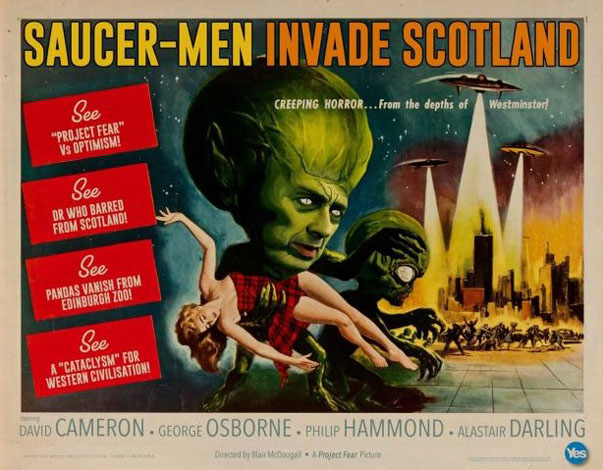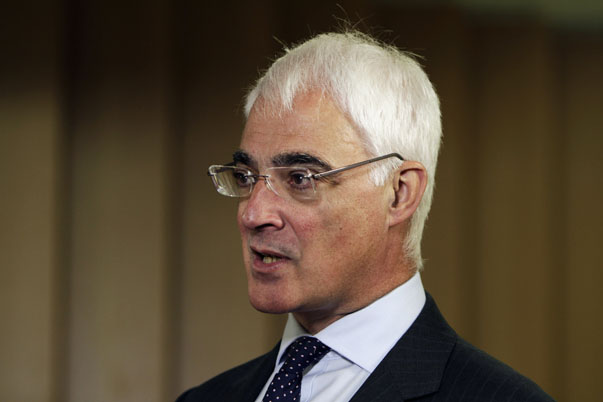The leaders of the Yes and No campaigns are getting ready for their second and final televised live debate (tonight, BBC2, 8.30pm).
A snap poll after the first referendum debate earlier this month suggested that Alistair Darling, the Better Together campaign leader, won the first battle.
So there will be some pressure on Scotland’s first minister, Alex Salmond, to level the scores in what will be a key opportunity to broadcast the nationalist message ahead of the independence referendum on 18 September.
What are the dodgy claims to look out for as the campaign heads towards the home straight?
Project Fear
“Why does the No campaign call itself Project Fear?” Mr Salmond asked in the first debate. Naturally, Better Together has never officially called itself this.
The name comes from a report in the Herald newspaper last year that claimed: “Privately, some inside Better Together even refer to the organisation as Project Fear.”
But accusations have persisted that the unionists are resorting to increasingly ludicrous scare stories about what might happen in the event of a Yes vote.
It’s true that shadow health secretary Andy Burnham told Holyrood magazine: “I would feel really genuinely sad if Scotland votes for independence, not just for our own self-interest and in the extra difficulty we would face getting a Labour government in England but I also don’t want to drive up the M6 and get my passport out or have to drive on the right when I want to drive on the left.”
Of course the nationalists don’t have any plans to make people drive on the left.
The passport issue is more complicated. The Scottish government says its wants passport-free travel, but the home secretary, Theresa May, has said England might introduce passport checks at the border if Scotland adopted a looser immigration policy.
Mr Darling said Mr Burnham was only joking when he made the remarks. Readers who want to judge whether the comment was light-hearted or not can read the comments in the original context here.
Mr Salmond also brought up the words of the defence secretary, Philip Hammond, who apparently warned that an independent Scotland would be more vulnerable to attacks from outer space.
Nationalists had a lot of fun with this.
Mr Hammond did say that military threats “come from two new domains, space and cyber space” – but this was almost certainly a reference to spy satellites rather than little green men.
Scotland won’t be able to join the EU for five years
Unionists initially seized on remarks made by the incoming president of the European Commission, Jean-Claude Juncker, that there would no new EU members in the next five years.
But his official spokeswoman said later that he had not been talking about Scotland.
Scotland on Sunday quoted an unnamed EU official as saying that Mr Juncker would fast-track entry to the union for an independent Scotland, but we have no idea who the source and can’t check the veracity of the story.
Other leading Eurocrats have said that a vote for independence would place Scotland outside Europe and applying for membership could be a long, complicated process.
Juncker’s predecessor Manuel Barroso has said it would be “extremely difficult, if not impossible” for Scotland to negotiate membership.
Spain’s prime minister Mariano Rajoy, who has his own separatist movements to deal with, has made ominous noises about Scotland which have led some to predict that Spain might use its veto to block Scottish membership.
As with so many other questions about the future post-independence, uncertainty reigns.
Scotland will be forced into the eurozone
The thorny issue of Scotland’s currency is sure to crop up again tonight.
Mr Salmond says he wants a currency union with the rest of the UK that will let the UK retain the pound. But all three main parties at Westminster have said they will refuse to let that happen.
Mr Darling appeared to score a point when he pressed his opponent on the nationalist “plan B”. Mr Salmond refused to say what his contingency plans are.
He has said he does not want Scotland to join the euro, but it has been suggested that this will be the country’s fate if it fails to negotiate a sterling union.
In fact, there is no realistic prospect of an independent Scotland joining the European currency zone in the short term, even if that is what Mr Salmond wanted.
Even assuming that Holyrood could fast-track membership of the EU, the country would have to satisfy a number of fiscal rules before it could join the eurozone.
One of them is that a member state has to have been a member of the Exchange Rate Mechanism for at least two years.
It is evidently possible for EU countries to put off joining the single currency indefinitely if they want to.
Sweden is technically obliged to join the eurozone under the Treaty of Maastricht but it gets around the obligation by refusing to join the Exchange Rate Mechanism.
Britain and Denmark have both negotiated an opt-out from the treaty requirement to adopt the euro.
Mr Salmond will probably face more pressure tonight say what he would do if the rest of the UK refused a currency union.
It is possible for Scotland to carry on using the pound outside an agreement with the Westminster government, but that would giving up control of monetary policy to the Bank of England, which would also have no obligation to bail out Scottish banks in another crisis.
The eminent economist Professor Joseph Stiglitz – who advises to the Scottish government – thinks the other parties are “bluffing” when they say they will block a currency union.
NHS spending has risen under the coalition
Mr Darling, a former Labour chancellor, could find himself in the awkward position of having to defend the coalition’s record on the NHS.
In a recent interview he stated that spending on the health service has increased under the current government.
It’s true that the NHS budget has risen since 2010, but only in cash terms. In real terms spending has been pretty much flat.
The UK Statistics Authority has said spending was actually 0.7 per cent lower in real terms in 2011-12 than it was in 2009-10.
Of course there are no guarantees that an independent Scotland would be able to spend more on public services. For a full FactCheck on Scotland’s finances see here.
Don’t forget to follow @FactCheck on Twitter tonight for live FactChecking of the second Salmond/Darling debate.







